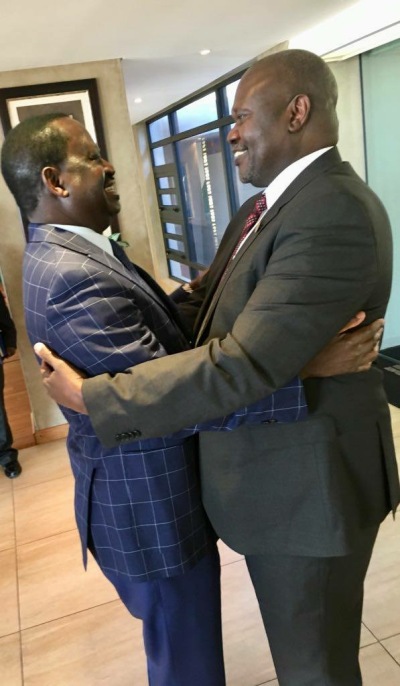Kenyan former prime minister holds talks with South Sudan rebel leader
June 8, 2018 (JUBA) – Raila Odinga, Kenyan former prime minister and head of has on Friday held talks with South Sudanese former First Vice President and rebel leader, Riek Machar in a private initiative to narrow the gaps between him and President Sava Kiir.

Sources with direct knowledge of the meeting in Pretoria told Sudan Tribune that few details came out of the discussions between Odinga and Machar, but it mainly focused on how the conflict in South Sudan should be ended so that the sufferings stop and the displaced people return to their home areas.
“We are still waiting for more details, but I briefly spoke to our chairman, Dr Riek Machar, and he told me the meeting went well. It all centred around how to stop the war and bring peace to the country,” a top opposition figure told Sudan Tribune from Nairobi, Kenya.
“Machar was receptive and appreciated the initiative of comrade Raila Odinga,” the rebel official further said.
Odinga’s initiative is not part of the IGAD-led efforts to settle the over-four-year conflict but reportedly aimed at building confidence between the two leaders and bring them to make concessions on the outstanding issues that prevent a political deal.
Also, it is not clear if President Uhuru Kenyatta is backing his initiative as the two men reconciled last March and the opposition leader has represented his country in the funerals of funerals of Winnie Mandela in April.
Kiir and Machar have agreed to meet in Khartoum on 17 June before another meeting with the IGAD leaders on the sidelines of an African Union summit in Mauritania at the beginning of July.
The second phase of the peace revitalization forum ended last month in Addis Ababa without agreement over governance and security arrangements. The opposition groups blamed the draft agreement for neglecting their demands and endorsing Juba positions.
(ST)
